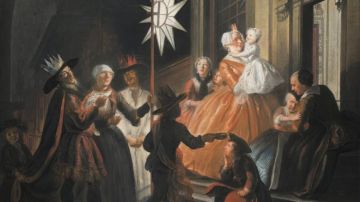Three Kings’ Day Traditions from Around the World
Three Kings’ Day—also referred to as Día de los Reyes Magos, the Epiphany, Theophany, and Day of Kings—is a festival observed by many Christians on January 6

Photo: Unsplash/@europeana
Three Kings’ Day—also referred to as Día de los Reyes Magos, the Epiphany, Theophany, and Day of Kings—is a festival observed by many Christians on January 6. (Celebration dates vary). In Roman Catholic and Protestant churches, Epiphany commemorates the adoration of the biblical infant Jesus by the Three Wise Men, or the Magi, who had come from the East; for Eastern churches, the focus is on the baptism of Jesus.
Below are some examples of Three Kings’ Day traditions from around the world—maybe you can incorporate some of them into your own celebration this year!
Spain
"My favorite holiday in #Spain was Three Kings Day. I miss the times I spent there!" – B. Snow #InLoveWithSpain https://t.co/k802LB41yD pic.twitter.com/rNiWrTu7sT
— Spain in USA (@SpainInUSA) December 29, 2016
In Spain, it isn’t until Three Kings’ Day, or Reyes, that all the gifts arrive. (It’s for this reason that Spanish children write their letters to the Wise Men instead of Santa.) Barcelona celebrates the holiday with floats on January 5, when the Reyes Magos usually arrive in the late afternoon by boat before parading through the streets in the Procession of the Kings. On the night of the 5th, children put their shoes by the door to indicate how many of them there are to the Kings. When they wake up the morning of the 6th, children find their gifts in and around the shoes.
Italy
https://twitter.com/jmarine/status/1214534782245208067?s=20
Schools and most businesses close on what’s known in Italy as La Befana, which the country observes as a public holiday. On the night before the holiday, children hang their stockings by their windows and fireplaces to be filled with gifts by Befana, a soot-covered woman who, as the legend goes, was approached by the Three Wise Men to lead them to baby Jesus. Though she followed the star of the Magi, she never found baby Jesus, and continues searching houses for him with a bag of gifts, traveling by broomstick. In memory of the story, some Italians make something called Befana cake, with a dried bean inside to represent baby Jesus.
Greece
Theophany, meaning “a visible manifestation of a deity,” comes from the Greek theos “god” + phainein “to show.” In Greece, Orthodox Christians celebrate the Epiphany, which they also refer to as the Blessing of the Waters, by diving into an icy body of water. This (mostly male group) competes for a wooden cross, tossed into the water during a ceremony meant to commemorate the baptism of Jesus Christ.
Mexico
Today is a special day in Mexico. Known as "El Día de Reyes"(Three Kings Day) #TheMayanCacaoCompany pic.twitter.com/pgSy9ip1pJ
— MAYAN CACAO COMPANY (@themayancacaoCo) January 6, 2016
In Mexico, crowds gather to taste the Rosca de Reyes, a round baked good meant to symbolize the Kings’ crowns. (It’s also been called an edible wreath.) Mexico City’s government sponsors an annual festival, free to the public, during which people come together to eat a giant rosca; last year, the event featured a cake weighing 9.3 metric tons, forming a 1,440-meters-long loop.
Germany
Dreikönigstag is how Germans refer to Three Kings’ Day, which marks the end of their Christmas season on January 6. Between Christmas and Dreikönigstag, the Sternsinger (“star singers”)—often a group comprised of four young people from the local Catholic community, three dressed as the Three Wise Men and one serving as a star bearer—go door to door fundraising for charitable organizations. After singing a song or reciting a prayer or poem, the Sternsinger may carry out the C+M+B house-blessing ceremony, ending with an inscription left on or above the door of a home. The letters stand for Christus mansionem benedicat, which translates into “May Christ Bless this House”; an alternative explanation is that the letters represent the Magi names Caspar, Melchior, and Balthasar.
–Anna Cherry is a writer and editor in New York City. She tweets @unacereza.

















